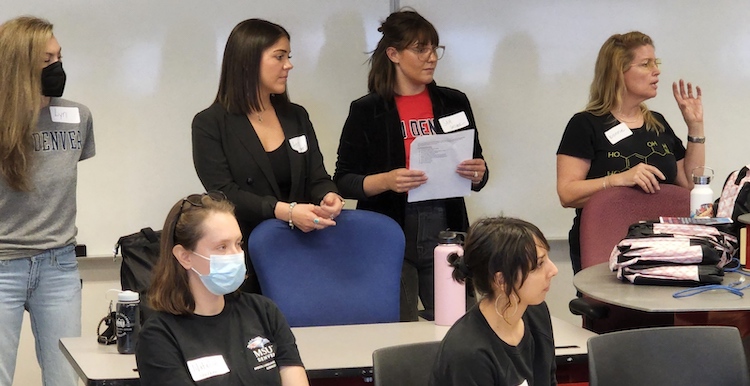

Metropolitan State University of Denver is establishing itself as a leader in STEM education. The Center for Advanced STEM Education hosts a number of initiatives such as pathway programs and resources for K-12; inclusion initiatives for women, students of color, students with disabilities and other demographics underrepresented in STEM; and tutoring, research and faculty grant support. Read about two exciting new STEM efforts below.
University houses new statewide STEM ecosystem
MSU Denver is now home to one of 100 STEM Learning Ecosystems Community of Practice across the globe.
SLECoP is a collective of thought leaders and innovators who work to ensure students of all ages are engaged in science, technology, engineering and mathematics courses by collaborating with schools, institutions, businesses and industry partners. SLECoP’s overall goal is to provide meaningful opportunities to pursue student engagement with STEM and intentionally focuses on underserved communities and students and families of color. SLECoP and its partners use a valuable type of learning with design-driven, experiential-connected material to help students relate to classroom materials with real-world application.
While some of the statewide ecosystems in the U.S. are housed under a governor’s office or funded by legislation, Colorado’s was driven by grassroots needs across the state. The ecosystem is designed to serve the needs of all communities and economic sectors. The ecosystem serves to collate and curate resources and information to help close the STEM-based education and workforce gaps.
The new statewide ecosystem will be housed at MSU Denver through the School of Education’s Office of Education Solutions. Janelle Johnson, Ph.D., associate professor, will serve as the ecosystem director.
“Our goal is to build a STEM coalition to uplift existing successful efforts, and jumpstart a cross-sector collaboration to bridge educational and economic needs across Colorado,” Johnson said. “Our definition of STEM is broad, interdisciplinary and inclusive.”
Members can leverage the new statewide ecosystem for:
- Earmarked federal funding
- Grants
- Outreach
- Volunteering
- Research
- Mutually beneficial collaboration
- Policy changes
- Workforce development
- Mentoring
- Employment opportunities
- STEM events
- Scholarships
SLECoP will also be convening for the first time since the pandemic June 20-22 for an event called People, Planet and Prosperity. The event explores practical strategies for how communities can use STEM to drive gains in equity, social mobility and efforts to safeguard the environment. Employees interested in representing the state should contact Johnson, who will be a panelist for the event, for more information.
Partnership with local schools
The University also recently signed an agreement with Northglenn High School, a STEM-based school in north metro Denver. This agreement allows for high school students in Northglenn’s STEM BIOMed pathway who meet certain qualifications to have guaranteed admission to MSU Denver. It also helps students identify paths in health-focused degrees in health care management, integrative health/lifestyle medicine and public health.
While at MSU Denver, students can expect to explore several health professions degree options, dedicated advising from the Department of Health Professions faculty and staff and a special advising session with a Health Institute health career navigator to discuss scholarships and the application process.
MSU Denver also hosted over 70 students from Northglenn’s two feeder middle schools, STEM Lab and STEM Launch, for a Health Professions Exploration Day on May 6. The event helped middle schoolers explore different health professions and talk with students about health-focused degrees.
“As kids we sometimes don’t think about the many different options we have as professions,” Erin Seedorf, Dr.P.H., said. “It is important to sharing information with younger children, so that they can start to see themselves in careers in the health and health care. This was also a great experience for MSU students to share their experiences in health professions with these young middle school students.”
Several departments and community organizations including the Department of Nursing; Department of Nutrition; Department of Speech, Language and Hearing Sciences; Department of Health Professions; Denver Health EMT Program; and Broomfield County Health Department helped students get hands-on experience with specific health careers. There was also a panel of students representing different health-focused degrees who were available to answer questions on their career choices.

